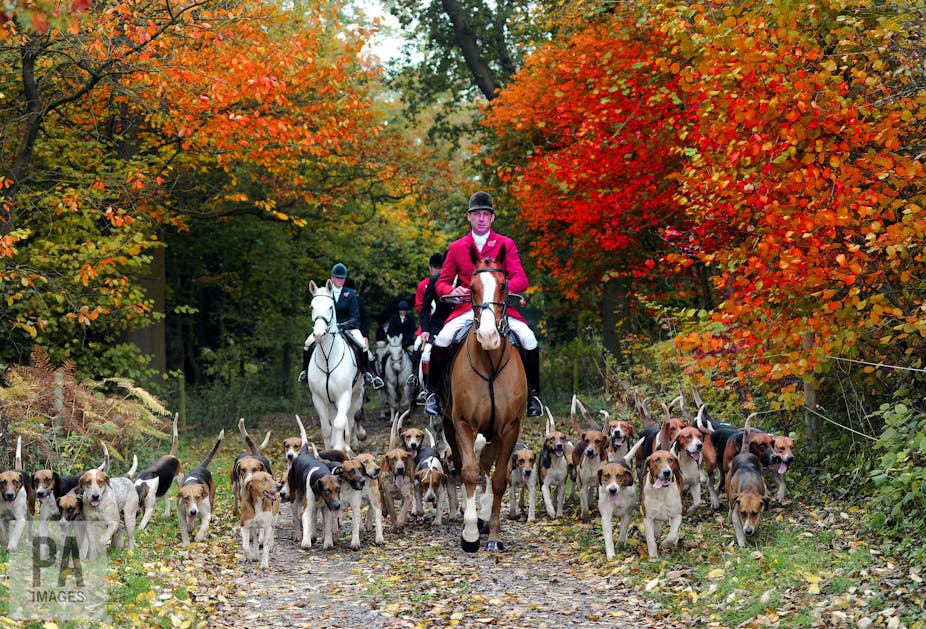Mary Webb’s classic novel Gone to Earth marks its 100th anniversary this year and remains extremely relevant. The novel has anti-fox hunting and anti-cruelty rhetoric at its core – so its centenary comes at a timely moment. Should the Conservative Party secure a majority after Theresa May’s snap election on June 8, the UK countryside could well be witnessing the return of hunting with hounds.
May has pledged to have a vote on rescinding the 2004 Hunting Act which bans the practice of using dogs to hunt wild mammals (other than to flush them out of cover to be shot). As Daniel Allen wrote in a recent article on this site: “It is time that politicians looked beyond political promises and personal legacies, to stop playing politics with animals, and start taking animal welfare seriously.”
In response to May’s statement, Bill Oddie, president of the League Against Cruel Sports, said that “foxhunting belongs to the dark ages of animal cruelty”. It has been more than a decade since the ban came into force – and May’s avowal of the archaic and brutal practice, marks a potential shift back to the kind of world that so horrified Webb.
The ‘death pack’
Gone to Earth, Webb’s second novel, received scant critical attention during her own lifetime, despite receiving warm praise from the Conservative politician Stanley Baldwin. It remains to this day a largely under-read classic, despite the fact that it was made into a film in 1950 by celebrated directors Michael Powell and Emeric Pressburger. The novel contains an important message, connecting the brutality of hunting with a tendency towards general human cruelty – a message we should remember before we plunge ourselves back into the dark ages Oddie warns us of.

Hazel Woodus, the 18-year-old protagonist of Webb’s novel, lives in fear of both the mythical “death pack”, which she imagines roaming the countryside, and the very real hunt, whose hounds pose an immediate physical danger to her pet fox, Foxy. Hazel and Foxy live in a constant state of fear and flight. Hazel, we are told, “identified herself with Foxy, and so with all things hunted and snared and destroyed”.
In Webb’s novel, those who kill for sport, for entertainment and who prey on the weak, represent the dark side of humanity which exerts its power over the defenceless – simply because it can.
Gladys Coles, Webb’s biographer, remarks upon the fact that the hunt symbolises the physical and psychological cruelty inherent in human nature, if unchecked. According to Gone to Earth, the death pack “hunts at all hours, light and dark; it is no pale phantom of dreams”. The death pack becomes more than just a haunting spectre with the realisation that it consists of “our fellows, all that have strength without pity”. It is, according to Webb, “mankind’s lack of pity, mankind’s fatal propensity for torture, that is the nightmare”.
Violent pastimes
A century ago, anti-foxhunting activists were, by and large, seen as cranks. Webb’s message went against the grain by connecting the cruelty of the hunt and the World War I battlefield. Gone to Earth, which had been written during 1916, the year of the Battle of the Somme, is inescapably coupled to the bloody historical realities of the war, the presence of which is felt throughout the text.
The absence of direct references to the war, a war in which three of Webb’s brothers fought, serve to make Webb’s message of pacifism even more poignant. The Somme, for Britain the bloodiest battle of the war, resonates throughout the novel where, for the protagonist, “the earth’s all bloody” and “the world’s nought but a snare”.

Though Webb might have been perceived as a crank, her voice against cruelty was accompanied by the likes of Henry Stephens Salt, social reformer and animal rights advocate. and the playwright and critic George Bernard Shaw.
For Salt, blood sports and warfare were “kindred pastimes” which both bred violence. Likewise, Bernard Shaw was equally revolted by “dehumanising sports”, such as fox hunting, “sports in which men revert to the excitements of beasts of prey”.
The objections to fox hunting that Bernard Shaw and Salt voice perhaps have less to do with concerns about animal welfare and more to do with the fear of the contagion of cruelty – the way we treat animals is only one step removed from the way we treat our fellow human beings.

Salt warned of “the tiger that lurks in all of us” and wrote that our inherent callousness “will not be easily tamed, so long as the deliberate murder of harmless creatures for ‘sport’ is a recognised amusement in every ‘civilised’ country”.
Despite the gruesome ending to Gone to Earth, Mary Webb was optimistic about the future:
We have left behind us the bloodshot centuries when killing was the only sport, and we have come to slightly more reputable times when lovers of killing are conscious that a distinct effort is necessary in order to keep up ‘the good old English sports’.
She prophesied that “better things are in store for us” – and, indeed, the 2004 act banning the practice of fox hunting was a step towards realising a more humane world, a move which a recent Independent poll suggests most are in favour of. Revoking the ban might not just plunge us back into the dark ages of animal cruelty, but into a world which also lacks compassion on a human level.

